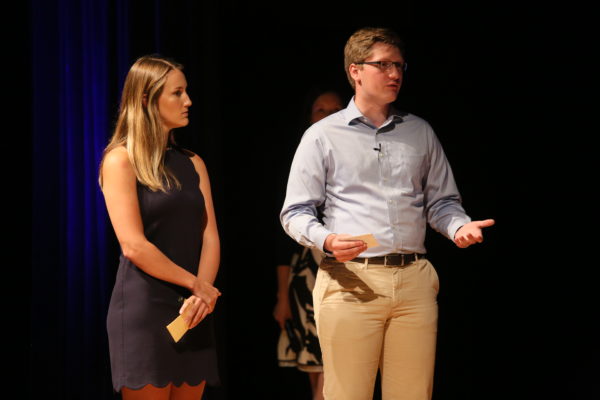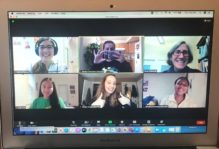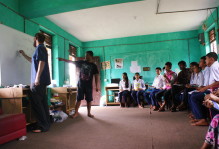Shark Tank 2018 – Concept Notes
Adapted from original article by Sara K. Eskridge.
Shark Tank is a research competition where students pitch international policy-relevant concepts to a panel of judges, or “sharks,” with the goal of winning up to $20,000 in research funds. Students partner with professors to find innovative solutions to international challenges.
Student teams (with concept notes linked in PDF format) include:
- Supporting Translators: National Security Concerns on the U.S. Failure to Help Allies Abroad by Charles Geddes and Diana Ibarra
- The Internet of Things: Why We Need Airbags for the Internet by Lexi Pacheco and Katie Weinsheimer
- Mobile Microinsurance: Understanding Barriers to Microinsurance Uptake Among Rural Farmers by Henry Crossman, Darrien Spitz, and Kayla Temple
- Mapping Resiliency: Geocoding Hezbollah’s Social Welfare Investment by Adam Kearney and Alexander Nocks
- Food for the Future: A Call for Better Aid by Andrea Chavez, Kia Garrett, and Jack Pohlmann
“We created the Shark Tank policy research competition because it is consistent with our origins—the first two research projects housed at the Institute were the result of student ideas,” says Professor Michael Tierney, Hylton professor of government and international relations and co-director of the Institute. “We believe that the next big idea can come from anyone, from a gray-haired professor to an 18-year-old freshman.”
Indeed, some truly world-changing efforts have stemmed from William & Mary’s Shark Tank contestants. Aili Espigh ’17 competed in the inaugural competition back in 2015, when she won for her project with Bella Kron ’17 and Caleb Ebert ’16. The project, “Reducing Data Gaps in Response to Humanitarian Crises: A Case Study of Project-Level Aid to Respond to Ebola,” tracked aid given day-to-day, with an eye toward helping donors make better decisions on where to send financial and humanitarian resources to mitigate the impact of a crisis.
“We ended up with more data than I had ever hoped, and we were able to prove that the estimated financing to the Ebola crisis was wildly incorrect,” says Espigh, who now works for a private Washington, D.C. defense firm. “We were able to hand this research over to Sid Ghose on the AidData team, who kept the project going. AidData continued the research and brought it to the United States Agency for International Development (USAID), where the project was given additional funding.”
This year’s competition boasts a quartet of talented sharks, who will weigh in on which students will follow in Espigh’s footsteps. They include:
- Katie Sell Garcia ’99, acting director of the Office of Market and Partnership Innovations, Bureau of Food Security at USAID;
- Peter Atwater ’83, President of Financial Insyghts LLC;
- Caitlin Moorman ’07, head of insights and analytics at Indiegogo;
- Theresa Whelan ’87, principal deputy assistant secretary of defense for homeland defense and global security, Department of Defense




No comments.
Comments are currently closed. Comments are closed on all posts older than one year, and for those in our archive.